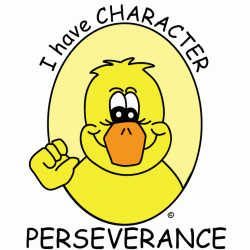
Now we have learned that the inner drive the child has to stick with something until they have learned it, whether it is riding a bike, swimming, math, reading, or how to be a good friend, is the key to achievement, the question is “How Can I as A Parent Teach My Child To Stick With Their Goals?” Here are 5 ways to help build the quality of perseverance in your child:
- Praise their efforts when they stick with something they are trying to do.
- Emphasize effort over grades when they bring their papers home from school
- Point out the example of others who have overcome obstacles and stuck with a project
- Set the example and talk about your own efforts to keep working on something you are trying to accomplish.
- Praise the hard work they put into a project more than the results and the end product.
If we reinforce that success is built on effort and hard work, doing the best that we can consistently and over time, our children will develop the quality of perseverance.




